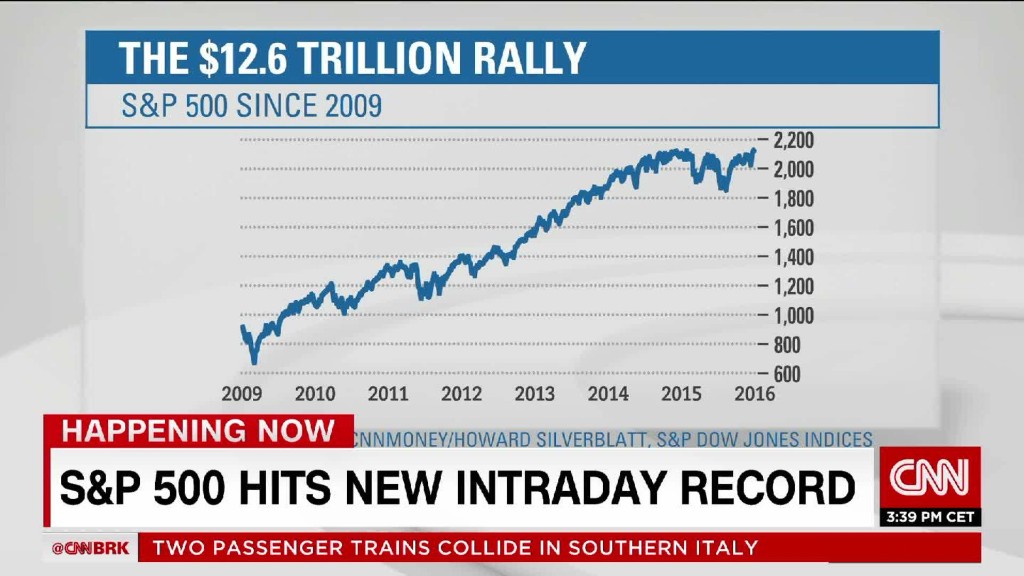Positive Effects of Chip Tariffs Exemption on Tech Industry
#tech #stock market #trade tensions #chip tariffs #exemption

Introduction
The S&P 500 rose on Thursday, led by tech, as President Donald Trump unveiled new chip tariffs that include a broad exemption. This news had a positive impact on the stock market, with the S&P 500 rising as a result. The exemption of chip tariffs is a promising sign for the technology industry and its investors. This move comes amidst the ongoing trade tensions between the US and China, which have caused fluctuations in the stock market and affected businesses worldwide.
Implications for the Tech Industry
The broad exemption of chip tariffs is a significant development for the tech industry. The move is expected to benefit major players in the tech sector, including companies like Apple and Intel. This exemption will allow these companies to continue importing and using chips without facing any additional financial burden. This will not only boost the performance of these companies but also contribute to the growth of the entire tech industry. With the exemption in place, tech companies can continue to innovate and bring new products to the market without any interruptions or added costs.
Potential Impact on the Market
The exemption of chip tariffs is a promising sign for the stock market, with tech stocks leading the way. This move is likely to have a positive impact on the overall market, as it signals a resolution in the ongoing trade tensions between the US and China. Investors are likely to see this as a step towards a more
About the People Mentioned
Donald Trump
Donald John Trump, born June 14, 1946, in Queens, New York, is an American businessman, media personality, and politician. He graduated from the University of Pennsylvania’s Wharton School in 1968 with a degree in economics. In 1971, he took over his family’s real estate business, renaming it the Trump Organization, through which he expanded into building and managing skyscrapers, hotels, casinos, and golf courses. Trump gained widespread fame as the host of the reality TV show *The Apprentice* from 2004 to 2015, which helped establish his public persona as a successful entrepreneur. Trump entered politics as a Republican and was elected the 45th president of the United States, serving from 2017 to 2021. His presidency was marked by significant policy actions including tax cuts, deregulation, the appointment of three Supreme Court justices, renegotiation of trade agreements (notably replacing NAFTA with the USMCA), and a focus on immigration control including border wall expansion. He withdrew the U.S. from international agreements such as the Paris Climate Accord and the Iran nuclear deal, and engaged in a trade war with China. His administration’s response to the COVID-19 pandemic was criticized for downplaying the virus’s severity. Trump was impeached twice by the House of Representatives—first in 2019 for abuse of power and obstruction, and again in 2021 for incitement of insurrection—but was acquitted by the Senate both times. After losing the 2020 election to Joe Biden, Trump challenged the results, culminating in the January 6, 2021, Capitol riot. He remains a central figure in American politics, having won the 2024 presidential election and returned as the 47th president in 2025, continuing to promote policies aimed at economic growth, border security, and military strength[1][2][3][4].
About the Organizations Mentioned
S&P 500
The S&P 500, officially known as the Standard & Poor’s 500, is a revered stock market index tracking the performance of 500 of the largest publicly traded companies in the United States[1]. Managed by S&P Dow Jones Indices—a joint venture majority-owned by S&P Global—the S&P 500 is widely recognized as a leading barometer of the U.S. stock market and, by extension, the broader economy[1][7]. It accounts for roughly 80% of the total market capitalization of U.S. public companies, with an aggregate value exceeding $57 trillion as of August 2025[1]. The index is weighted by market capitalization, meaning larger companies exert a greater influence on its movements[1][2]. Its top holdings include tech giants like Nvidia, Microsoft, Apple, and Alphabet, which together represent a significant portion of the index’s total value[1]. ## History and Evolution The S&P 500 traces its origins to 1923, when the Standard Statistics Company (later becoming Standard & Poor’s) launched an index of 233 companies[3]. In 1957, it expanded to include approximately 500 companies, formalizing the structure familiar today[3]. Over the decades, the index has evolved into a cornerstone of global finance, reflecting the dynamism of the U.S. economy and the rise of sectors like technology, healthcare, and consumer goods. ## Purpose and Impact The S&P 500 serves multiple critical roles: it is a benchmark for investment portfolios, a basis for passive index funds and ETFs, and a key input for economic forecasting tools like the Conference Board Leading Economic Index[1][6]. For companies, inclusion in the S&P 500 is prestigious and financially impactful, often triggering significant buying activity as funds tracking the index adjust their holdings[2]. For investors, the index offers a convenient, diversified exposure to the U.S. equity market through index funds and ETFs[4
Apple
Apple Inc. is a leading American multinational technology company known for pioneering personal computing, mobile devices, and software ecosystems. Founded in 1976 by Steve Jobs and Steve Wozniak, Apple revolutionized technology with the first commercially successful personal computer and mainstream adoption of the graphical user interface (GUI), setting new standards in product design, user experience, and seamless integration across devices[2]. Headquartered in Cupertino, California, Apple’s product lineup includes the iPhone, iPad, Mac computers, Apple Watch, AirPods, and services such as the App Store, Apple Music, and iCloud. The company has built a vast ecosystem that enables third-party developers to expand product functionalities, strengthening its market dominance. Apple is widely recognized for its innovation in hardware, software, and services, with an emphasis on aesthetics and privacy. In 2025, Apple committed to its largest-ever investment initiative, pledging $600 billion over four years in the United States to boost manufacturing, research and development, and advanced technology sectors like artificial intelligence (AI) and silicon engineering[1][3]. This includes new manufacturing facilities, expanded R&D centers, and a program called the American Manufacturing Program (AMP) to encourage domestic production of critical components. These efforts support over 450,000 U.S. jobs and aim to establish a robust supply chain within the country[3]. Financially, Apple remains a powerhouse with a market capitalization of $3.84 trillion and annual revenue exceeding $400 billion. However, in 2025, it faced challenges including a 19% decline in stock value, intensified regulatory scrutiny from the U.S. Department of Justice over antitrust issues, legal disputes related to the App Store, and competitive pressure in AI technology[1][2]. Despite these hurdles, Apple continues to innovate, recently updating its software platforms with a unified "Liquid Glass" design and expanding its AI-driven personal assistant, Apple Intelligence[1]. Under CEO Tim Cook’s leadership, Apple balances technological advancement
Intel
Intel Corporation is a leading American multinational technology company specializing in the design and manufacture of advanced semiconductors that power computing devices globally. Founded in 1968, Intel pioneered the development of microprocessors, becoming the dominant supplier of x86-based processors for PCs, servers, and other computing platforms. The company is known for its continuous innovation in semiconductor technology and its role in shaping the modern computing landscape. Intel's recent technological advancements include the launch of the Intel® Core™ Ultra series 3 processors (code-named Panther Lake) and Intel® Xeon® 6+ processors (Clearwater Forest), both built on the cutting-edge Intel 18A semiconductor node—currently the most advanced manufacturing node in the United States. These products are manufactured at Intel’s state-of-the-art Fab 52 facility in Chandler, Arizona, showcasing Intel's commitment to domestic production and technological leadership[1]. In the face of intense competition from rivals such as AMD and the architectural shifts exemplified by Apple’s move to its own silicon, Intel has been undergoing significant restructuring. This includes workforce reductions by approximately 15%, aiming to streamline operations, improve efficiency, and focus on core growth areas like AI and data centers. Financially, Intel reported solid demand and revenue resilience, with Q2 2025 revenue reaching $12.9 billion, exceeding guidance despite challenges from one-time costs and impairments[3][5]. The company is also enhancing its foundry business and AI roadmap to strengthen its competitive position and long-term shareholder value[3]. Intel’s strategic partnerships, including a $5 billion investment by Nvidia to jointly develop CPUs, and talks of adding AMD as a foundry customer, highlight its adaptive approach to industry dynamics[6]. Despite recent challenges and market shifts, Intel remains a crucial player in the semiconductor industry, advancing AI-enabled platforms and maintaining a significant impact on the global technology ecosystem[1][6].
















